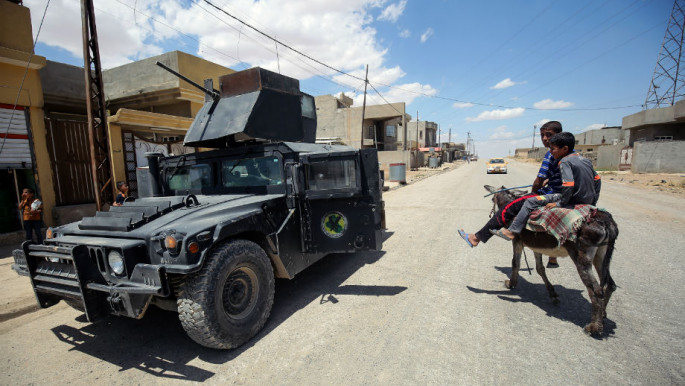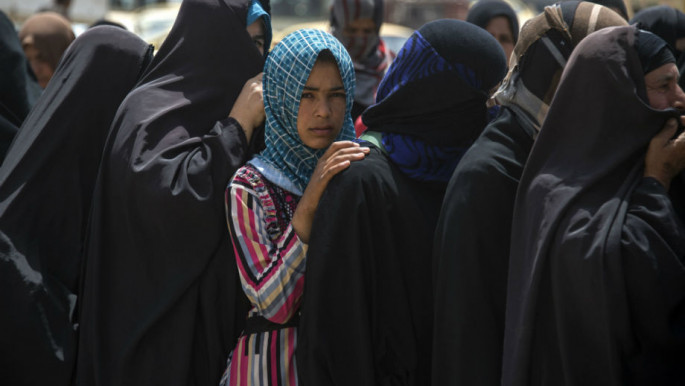The Iraq Report: Government crimes fan flames of conflict
The Iraq Report is a new weekly feature at The New Arab.
Click here to receive The Iraq Report each week in your inbox
Iran-backed Shia militias and government troops took centre stage once again in Iraqi affairs this week, and in gruesome fashion. One of Europe’s largest investigative journalism outlets has uncovered how the Iraqi state and allied Shia militias target Sunni civilians, subjecting them to rape, torture and murder. The New Arab has also confirmed similar accounts, detailing horrific atrocities and abuses committed against the people of Mosul from both militias and government forces alike.
The spate of human rights violations – and potentially war crimes – in Mosul has been exacerbated by political decisions in Baghdad, as well as the return of the spectre of sectarian abductions and murders that broke out across the country in 2006. While the Iraqi government is keen to attract western support in its efforts to fight the Islamic State group, there are genuine concerns that Baghdad’s policies and insouciance in the face of sectarian atrocities will give rise to greater levels of violence.
Shia militants rape, torture and kill Sunnis
Der Spiegel, one of the largest news publications in Europe, this week published harrowing accounts and photographs of Iraqi forces abusing Sunni Arabs in Mosul. The German piece, titled “Not heroes, but monsters”, referred to a slogan commonly used by the Rapid Response Forces that claims that the unit comprises “Heroes, not destroyers”.
Ali Arkady – a Kurdish photojournalist who has now been forced to flee Iraq for his safety – was given unprecedented access to Iraqi forces controlled by the Badr Organisation, one of Iran’s many proxies in the country, operating under the authority of the interior ministry. Arkady reported that he witnessed troops from the Rapid Response Forces torturing and murdering men and young boys, and also raping their own allies from the so-called Sunni Mobilisation Forces. Arkady was even encouraged to join in on the abuse by the soldiers with whom he was embedded.
Arkady wrote that he was present when a Sunni man was dragged from his bed in the middle of the night, and an Iraqi soldier then proceeded to boast about raping the man’s wife. Arkady then photographed the distraught rape victim, holding her young child in her arms, both clearly terrified and ashen-faced.
The photojournalist also revealed how the Rapid Response Forces and the Federal Police – both under the control of the interior ministry – were competing with each other, with one particularly shocking incident where the police were bragging about raping a beautiful woman in Mosul. Member of the Rapid Response Forces replied with a vow that they would also be paying her a visit.
 |
| Boys on a donkey watch a Humvee belonging to the Counter-Terrorism Service in west Mosul [AFP] |
Crimes from which even IS ‘stands aloof’
Disturbing accounts similar to those exposed by Der Spiegel have also been witnessed by The New Arab’s reporters on the ground, who report that journalists embedded with Iraqi forces are ordinarily only allowed to speak to civilians under the supervision of soldiers, who exclusively praise the Iraqi armed forces.
However, The New Arab was able to speak to some residents and even soldiers who revealed the day-to-day realities people now face in recaptured areas of Mosul, including women being arrested by the security services.
Across streets daubed with sectarian graffiti carrying messages such as “The Shia were here and stomped on your heads” in a Sunni city, people wore clothes that fit only loosely due to hunger, our reporter said. Residents also complained of their property being looted, and the army quartermaster responsible for giving out food aid to civilians was sexually harassing women and attempting to take advantage of their hunger.
An Iraqi officer based in Shirqat, south of Mosul, told The New Arab that he was aware of crimes being committed by the Iraqi military and militias in Mosul that were so bad, “even IS stands aloof [from perpetrating them]”.
PMF influence heralds regional sectarian violence:
Although these Shia-dominated militias, including the Popular Mobilisation Forces (PMF), largely follow Iranian orders, the Iraqi parliament passed a law in December 2016 that formally recognised the PMF as an official branch of the Iraqi armed forces. The Badr Organisation that controls the interior ministry and provides the vast majority of the manpower for the Rapid Response Forces and the Federal Police is also a key component force of the PMF, aside from their control over major militarised police and special forces units.
The fact that reports also state the army was also involved in these atrocities indicates that sectarian armed Shia groups have infiltrated almost every level of the Iraqi security apparatus, including the much-lauded “Golden Brigade” known as the Counter-Terrorism Service. This in turn raises many questions regarding Baghdad’s culpability for these actions - which may yet amount to war crimes and crimes against humanity.
In a bid to shore up his position before local elections this year and a general election next year, Prime Minister Haider al-Abadi has also reportedly given Shia militants a freer hand in where they operate, and in how they conduct operations in order to curry favour with the increasingly influential militants.
The PMF’s increased power and influence over political affairs was also demonstrated by one of its senior representatives, Faleh al-Fayadh, meeting with Syrian President Bashar al-Assad last Thursday. Fayadh and several people representing the Abadi administration, reportedly discussed Iraqi-Syrian military cooperation, including Iraqi Shia militants fighting on behalf of the Syrian regime.
Following the meeting, Iraqi Shia fighters released a video on Sunday showing them allegedly targeting US-led anti-IS coalition aircraft in Syria. This comes despite the fact that it is coalition aircraft providing the bulk of the close-air support for the Iraqi fight against IS militants.
 |
| Women displaced from their homes queue to receive food and water in west Mosul [AFP] |
Spectre of death squads returns to Baghdad
This increased military, diplomatic and political clout has resulted in the PMF having 180 military posts in Baghdad alone, outstripping the number of positions controlled by the national army and police forces.
Units of the PMF in Baghdad have reportedly been responsible for an increase in major crime, including armed robbery, abductions and murder. In scenes reminiscent of the darker days of the sectarian bloodletting in Baghdad, a wave of murder-kidnappings has struck the capital. The corpses of mainly Sunni residents have been found dumped in side streets and rubbish skips, killed execution-style, reportedly by the PMF. The corpses had ominous notes attached to them threatening other Sunnis: “Do not enter Baghdad”.
The growing influence of the PMF, coupled with the increasing violence across the country and especially in Baghdad led firebrand Shia cleric Moqtada al-Sadr to slam Iraq’s militias. Although Sadr himself created the Jaysh al-Mahdi militia that was responsible for numerous murders in the capital during the US occupation, the cleric said that one unnamed militia leader was so violent that he abducted 1,500 people to avenge the kidnapping of his brother.
NATO may train Iraqi forces
Despite all of this, crimes committed by Iraqi forces and Shia militants loyal to Tehran appear to take a back seat in the considerations of western powers, including the United States. Senior US military commander General Joe Dunford has floated the idea that NATO may assume responsibility for training Iraqi troops, helping in the setting up of military academies and assisting in developing Iraq’s logistics and acquisitions network.
While Washington may commit to curtailing the expansion of these militants through limited strikes in order to contain Iranian ambitions across the region – as in al-Tanf in Syria last Thursday – it still maintains a large force of advisers and support personnel in Iraq, as well as significant air assets to support forces with direct links to extremist groups.
While this may be due to expedience and a desire to defeat IS, there is a strong possibility that turning a blind eye to extensive and documented abuses may encourage a further festering of an already hyper-sectarian environment.
Although groups like Amnesty International have called on the US and its allies to do more to use their leverage of arms, funding and direct military support to Baghdad to curtail these excesses and abuses, the coalition has so far failed to do so. In turn, defeating IS may not end the war against extremism in Iraq, but could instead start a new, more violent chapter in the country’s already tragic story.
The Iraq report is a new weekly feature at The New Arab.
Click here to receive The Iraq Report each week in your inbox



